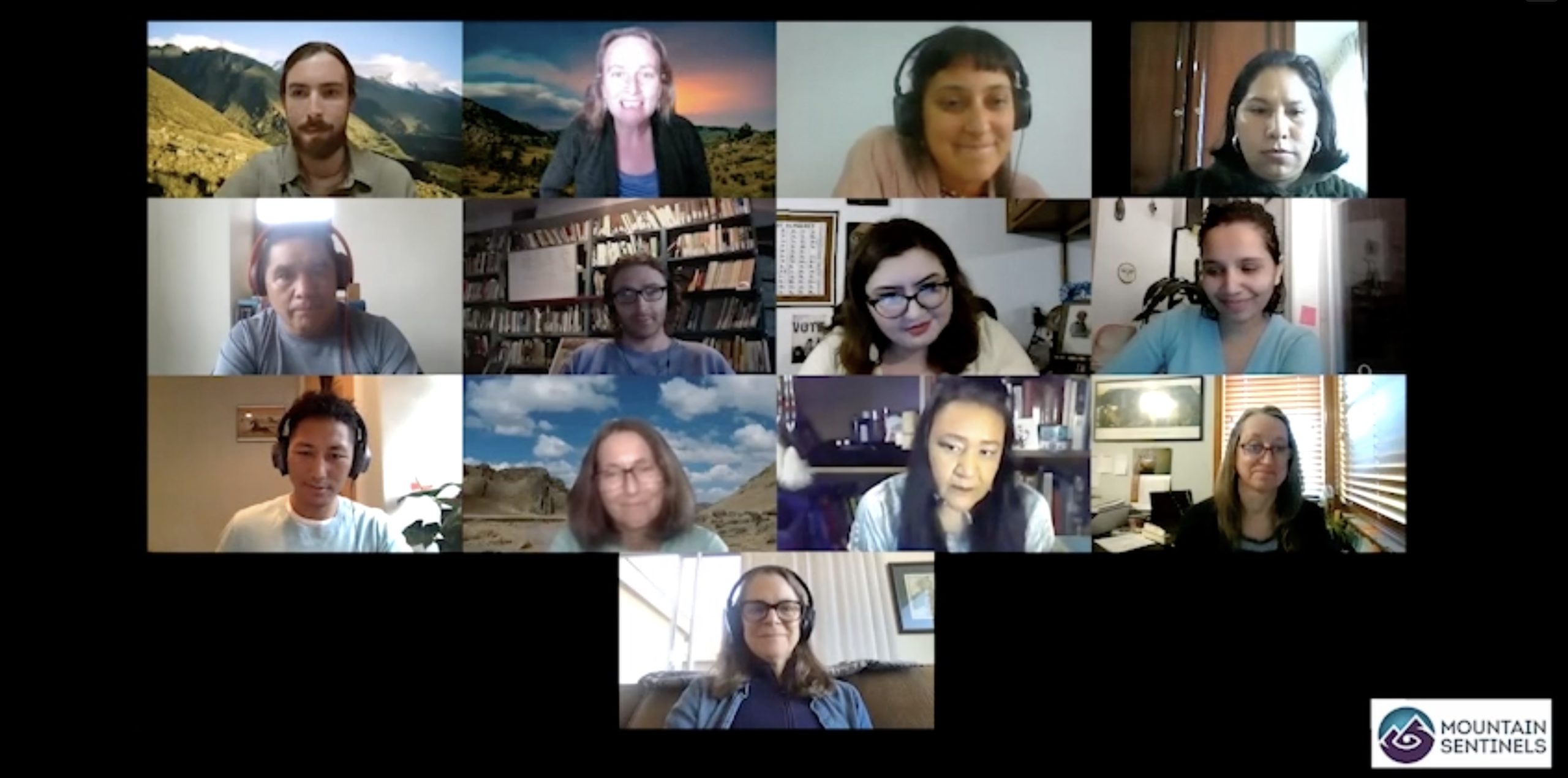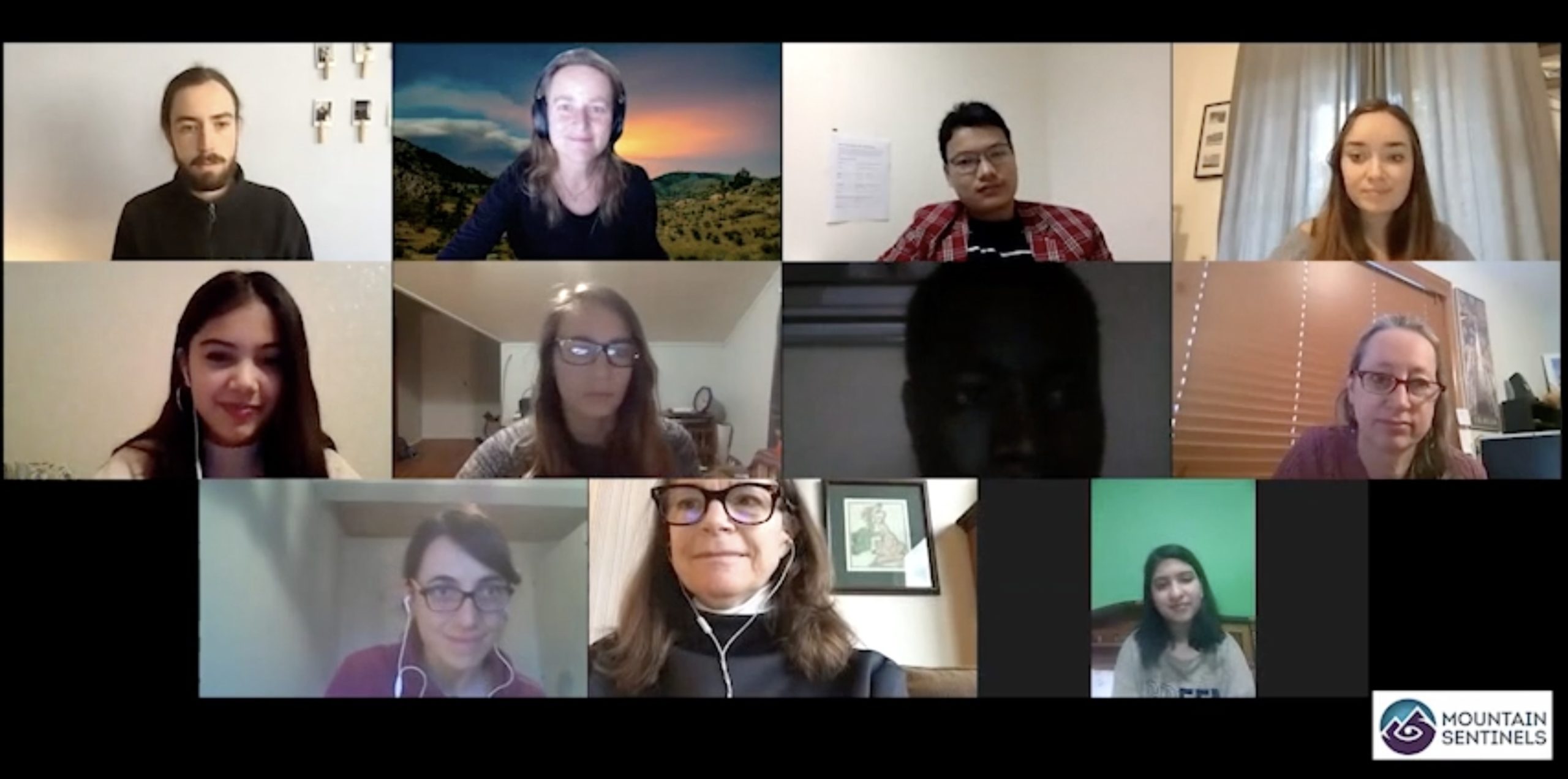Sam Hulsey | Huaraz, Ancash, Peru |
Representing nine countries, ten mountain ranges and spanning eleven time zones, the Mountain Sentinels Fellowship Cohort (2020-2021) came together in late October for the very first virtual gathering of the fellowship year. As part of the program, fellows have the opportunity to meet once a month to engage in open discussions related to issues of mountain sustainability and to share updates on their projects. From the Pamirs to the Andes, and the Himalayas to the Albertine Rift, our fellows attended the inaugural Zoom meeting where they had the opportunity to meet one another for the first time, discuss their projects and talk about the impacts of COVID-19 on their mountain communities. Some of our fellows hopped on the call at less than ideal times, with several early-risers ringing in at 7:00 am, others at 10:00 pm, and one fellow even making the extraordinary effort to join us while in mid-transit.
The fellows’ projects are as diverse in scope as the cohort itself, with each unique initiative addressing an implication of the global pandemic on a specific mountain community. Perhaps the most exciting takeaway from the first virtual gathering is that the fellows are identifying and addressing ubiquitous, pressing issues for mountain communities across geographical diversity.
Vidal Rondán Ramírez (Perú), a life-long conservation practitioner and educator, and Prinsha Niraula (Nepal), an energetic undergraduate with a passion for value-based teaching, are both addressing challenges for public education in their mountain communities. The seemingly overnight switch from in-person classes to remote learning caught rural schools under-equipped in both technical resources and the teaching skills necessary to implement an online curriculum. As a response to this lack of resources, Vidal’s project seeks to provide radios to families in the Andean community of Patapata, Yungay, so students may access the Peruvian remote learning program, “Aprendo en Casa” (I Learn at Home). In addition to providing direct local support, Vidal plans to give voice to the challenges facing public education in the Andes through coordinating art projects in which local students and community members will express the difficulties in education experienced during the pandemic through various media. He hopes to make these artistic expressions visible on both a regional and national level.
In her home village of Salyan situated in the lap of Mount Everest, Prinsha plans to support a local school by providing teachers with the training necessary to conduct effective online classes. Differing markedly in nature from the traditional classroom setting, Prinsha will guide local educators in techniques for online learning that will help strengthen their capacities to develop and carry out a remote learning curriculum. In addition to assisting teachers adapt to the “new norm,” of education, Prinsha will conduct in-person classes for students that focus on themes of health awareness and mountain sustainability during visits back to her home community.
Strengthening community through agriculture are key focuses for both Rodrigue Batumike (the Democratic Republic of the Congo) and Jackson Napier (Kentucky, US), both of whom are conducting projects in communities where lockdown measures in response to COVID-19 underscore a need for locally grown produce. Rodrigue, currently pursuing a master’s degree in forestry management at the University of Uganda, is pooling his resources to support the Twa indigenous group living around the Kahuzi-Biega National Park. The Twa are a traditional hunter-gather group, meaning they are constantly on the move and own virtually no land. The quarantine measures in the DRC have restricted both the Twa’s traditional movements as well as opportunities to earn a modest supplementary income from informal labor. Having collaborated with the group in previous projects, Rodrigue intends to offer workshops in vegetable gardening and rabbit breeding for interested members of the Twa community as a means of mitigating the impacts of quarantine measures on their hunter-gather livelihood.
Meanwhile, halfway around the world, Jackson Napier is uplifting his Appalachian community of Mount Vernon, Kentucky through establishing a community-based gardening project. For Jackson, a current graduate student in Appalachian Studies at East Tennessee State University, the COVID-19 outbreak served to further highlight the issue of access to fresh produce in a time when personal nutrition is of utmost importance. As caretaker of the Appalachian Science in the Public Interest (ASPI) offices, Jackson noticed that the property’s ample outdoor area could be repurposed to host several greenhouses. For his fellowship project, Jackson plans to enhance community well-being through initiating a community-based gardening project on the ASPI campus in Mount Vernon, where neighbors will be invited to participate in gardening activities and benefit from a new source of accessible organic vegetables. In addition to helping improve local nutrition, Jackson envisions utilizing the greenhouse project to strengthen the overall sense of community in the immediate area through hosting monthly events.
For Siya Aggrey (Uganda) and Khai Sawn Tual (Myanmar), access to public health information is a pressing issue for their communities in the context of COVID-19. Siya, an eco-health specialist working at the interface of conservation biology and human ecology, plans to establish a radio talk show in his hometown of Kween District in the Mount Elgon area. The show will cover important health-related topics for a community that already had limited access to health information prior to the COVID-19 pandemic. Complementing the radio talk show, Siya also plans to provide electricity to a local secondary school where he will host workshops on health education for students.
In Chin State, the most linguistically diverse region of Myanmar with fifty-three local languages spoken among mountain tribal groups, effective communication of COVID-19 health information is a significant challenge for many communities. For speakers of the Tedim language and its various dialects, government health awareness campaigns conducted in Burmese, Myanmar’s official language, have proven ineffective in communicating vital information to minority ethnic groups. Khai, a current Sociology Ph.D. student based in Hong Kong, is seeking to support his home community through providing critical health information in the local languages of the Tedim Township, helping raise awareness on the proper precautions to take for COVID-19 prevention.
Energy autonomy for mountain communities is another salient theme for this group of fellows. Yufna Soldier Wolf (Wyoming, US), an activist and member of the Northern Arapaho Tribe, is utilizing fellowship funding to develop a renewable energy strategy for her home community, the Wind River Indian Reservation. For Yufna, the COVID-19 pandemic has demonstrated how critical it is that First Nations transition to sustainable energy sources as a means of ensuring cultural preservation and strengthening tribal sovereignty. Similarly, Kerry Mendoza Loayza (Perú), is seeking to install a small solar system for her pastoralist community whose livelihoods are directly linked to animal husbandry. In her highland community of Ipas, where strict national quarantine measures have restricted vendors from reaching markets, Kerry is seeking to use solar energy and a WIFI installation to create new opportunities for community members to sell goods through online platforms.
Rejuvenated by their positive energy, we look forward to our future virtual gatherings where experiences will continue to be shared among this diverse group of mountain voices. As the fellowship year progresses, we eagerly await to see synergies form among the cohort and the fellows’ projects make the leap from proposals to action. There is no question that this group will make significant impacts on their project areas and, undoubtedly, on the Mountain Sentinels community as well.


